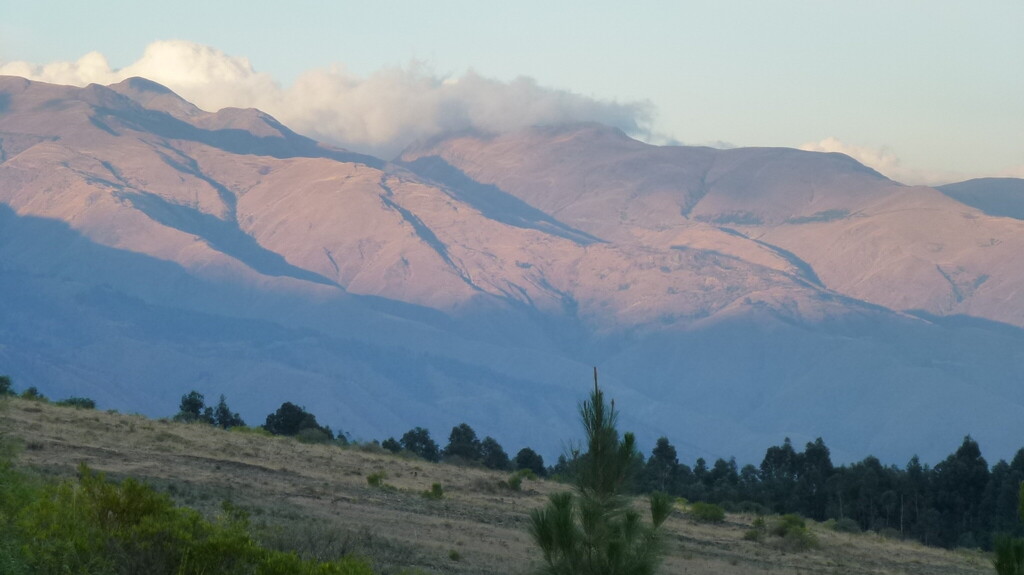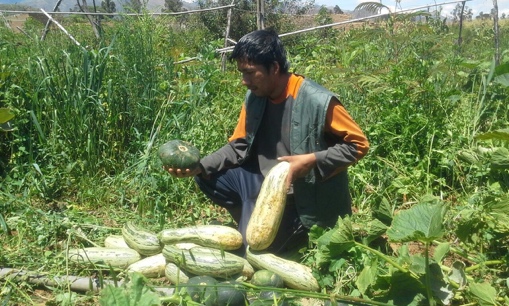Skepticism gives way to a vision of the future
"It was pure coincidence," he says. Three years earlier, the agroforestry engineer degree program was opened in Arani. In his childhood Alejandro had contact with agriculture thanks to his parents. The engineer in charge knew him and asked him if he would like to do another study in this field. First Alejandro was skeptical: "Why should I study if I already had a job?" But due to the poor and unreliable payment as a teacher in Bolivia and the free enrollment fees in the first year of study, he could be convinced. "I was hoping for a better future", he said. And to this day he does not regret the decision.
Ran to the practice
In the parcel donated by Naturefund, Alejandro was then able to put his acquired knowledge into practice. "My family and neighbors just shook their heads when they saw the shrubs, the dense litter and the mixture of the many different crops. But the ground needs protection against the wind and the strong sun", he explains.
For him, rethinking was also not easy: "In Arani, the soil is usually tilled in the hibernation and remains uncovered during the dry season. The sandy soils are then blown away by the strong winter winds. I have learned a lot about natural processes and realized that our agriculture is not good for the earth. Agroforestry is poorly known in the area, but that's the only way we can help Earth and feed our families with healthy food."
From a healthy soil the vegetables taste better
His family's doubts were dispelled as soon as his first crop of beans and coffee between the forest and fruit trees became richer than outside the agroforestry system.
"Since then they share my curiosity. They bring me seeds and encourage me to try new things", he says with great pleasure.
The additional manual labor and constant adjustments of the care measures depending on the plant species do not disturb Alejandro. "I am convinced that it is worthwhile working a bit more and being able to eat better. My family also believes that it tastes better without chemicals and healthy soil."
Independence and more joy of life
"I feel better in general", he says. Through his own business, which seems to be gaining more and more from day to day, he gets an independence that he did not have in his job as a teacher. His financial worries are forgotten. Alejandro is now harvesting his own seeds and has his own small nursery. The project parcel has grown twice as well. "I'm independent", he smiles.
What the future brings
The Bolivian can imagine working again as a teacher, but would not want to give up his independence again. His goal is to finish his studies and probably then work part-time as a teacher. So he has his teacher's salary, but does not immediately get into trouble if it is not paid on time.
His dream is to spread agroforestry and the respectful treatment of nature. Through his own observations, he makes great contributions to the optimization of the project in terms of local conditions.
His work bears the first fruits - and not just in the form of apples and peaches. At the National Agroforestry Congress, which will take place in Arani at the end of November, he is invited to present his parcel as a practical example of the optimal use of the Dynamic Agroforestry.
"Back to the roots"
The cultivation method of the dynamic agroforestry is based on the knowledge of indigenous peoples of Latin America - perhaps ancestors Alejandros used centuries ago similar cultivation methods?
Article based on interview with Charlotte Siegler of Ecosaf
Join us and support our project in Bolivia. With your help, more people like Alejandro can improve their lives while building ecosystems:
More about Dynamic Agroforestry
Support the project in Bolivia

